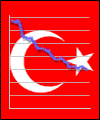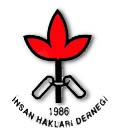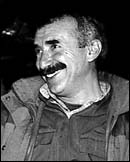9
April 2001
![]()
2. "Lone Protester Taps Into Turks'
Anger at Economy", Man Called Hero for Hurling Cash Register
at Prime Minister.
3. "Turkey Issues Kurdish Guidelines",
Turkey has called on state-owned broadcasting company to avoid calling
Kurdish citizens of Turkey ``Kurds'' or using terms which might suggest
sympathy for Kurdish rebels, news reports said Friday.
4. "Turks protest jail reform as third inmate dies
on hunger strike", a hunger strike among Turkish inmates
against controversial jail reforms has claimed its third victim, sending
relatives on to the streets to protest, Anatolia news agency reported.
5. "'If you're liberals, do what is necessary'",
Karayilan said that that the economic crisis being experienced in Turkey
sprung from the fact that, despite saying 'yes' to a liberal economy,
the state organs, foremost the militaristic institutions, had not carried
through with the necessities of a liberal economy.
6. "Vural: We should hurry, not EU",
stressing that Turkey should not miss the train of EU enlargement in
2004 or 2006-2007, Vural says Turkey should not lose any more time.
1. - Middle East Newsline - "Turkey reduces military budget along Greece":
ANKARA
Turkey is reducing its military budget as its longtime rival Greece
has postponed a major fighter-jet procurement program.
The reduction of Turkey's military budget comes as the government of
Prime Minister Bulent Ecevit has determined that Greece is doing the
same. Greek government leaders are calling on Ankara to cooperate in
reducing defense expenditures.
So far, Greece has decided to postpone by at least three years the $4.4
billion purchase of the Eurofighter. The delay was taken amid a decision
by the government in Athens to invest more resources in social programs.
Officials said Turkey regards its main threat from Iran and Syria. But
they acknowledged that Ankara's defense budget has been reduced by a
third because of the huge drop in the Turkish lira.
"Reducing military purchases is a matter which must be discussed
by the military authorities," Huseyin Dirioz, a Turkish Foreign
Ministry spokesman, said. "Turkey's geopolitical conditions are
different from those of Greece." ![]()
2. - Washington Post - "Lone Protester Taps Into Turks' Anger at Economy":
Man Called Hero for Hurling Cash Register at Prime
Minister
ISTANBUL
Ahmet Cakmak, a florist from Ankara, had a dream this week that sparked
a revolt. Angry that the Turkish government created an economic crisis
six weeks ago and so far has done little to solve it, Cakmak on Wednesday
threw a cash register at Prime Minister Bulent Ecevit.
It was a senseless act of defiance that captured imaginations across
Turkey. By Thursday, Cakmak was being hailed as a visionary and national
hero. Thousands of people have staged protests in cities around the
country demanding that the government do something -- anything -- to
shore up the economy.
The mass outpouring of anger, highly unusual for Turkey, is creating
a serious threat to the survival of the government as it attempts to
stop the slide of its currency and win new international financial support.
Domestic and foreign confidence is dwindling as calls increase for Ecevit's
three-party coalition to resign, making it doubly difficult for the
government to attract the $10 billion to $12 billion it says it needs
to stay afloat.
Noting that "the likelihood of a severe economic downturn poses
risks to the political status quo," Moody's Investors Service today
downgraded the ratings of 16 Turkish commercial banks and changed the
outlook for government bonds and commercial banks from stable to negative.
The ratings agency cited "highly unsettled" financial markets
and investor confidence.
The downgrades capped a week of bad news during which the value of the
currency plunged 14 percent to 1,182,079 Turkish lira to the dollar.
The lira is now 44 percent below its value on Feb. 22, the day the government
abandoned an economic reform program crafted by the International Monetary
Fund, including a controlled exchange-rate policy, and allowed the lira
to float.
On Monday, Fitch international rating service downgraded the country's
corporate and currency ratings, citing "the damaging lack of urgency
in putting a more convincing [rescue] program in place." On Tuesday,
the government announced that wholesale prices rose 10 percent in March.
On Wednesday, it ordered a 21 percent hike in gasoline prices, the fifth
increase in 43 days.
Since the start of the crisis, civil servants' average salaries have
plummeted about 35 percent because of inflation and currency depreciation,
according to a report by the Anatolian News Agency. In constant dollar
terms, a teacher with a monthly salary of $381 six weeks ago now brings
home $248. The economy, once projected to grow about 4 percent this
year, is expected to shrink about 2 percent.
The price of imported medicines has skyrocketed, and some suppliers
are refusing to ship drugs to Turkey because of the uncertain exchange
rates, leading to severe shortages. Hospitals reportedly are postponing
chemotherapy treatments because of limited supplies of blood products.
Car sales are down 90 percent. Unemployment was 18.3 percent before
the crisis, but tens of thousands more are now out of work. About 75
percent of the 300,000 workers in the shoe industry have lost their
jobs, as have 140,000 textile workers.
But it was the cash register-throwing florist who gave a human face
to the anger and desperation felt by common Turks. Yelling, "Mr.
Prime Minister, I am a tradesman!" Cakmak heaved an empty cash
register at Ecevit as the prime minister walked down the steps outside
his Ankara office. Ecevit looked stunned when the machine splintered
at his feet, and security guards whisked Cakmak away.
After spending a night in jail and paying a $37 fine, Cakmak explained
to reporters on the courthouse steps that he was desperate about being
unable to make payments on a $6,000 loan because of the collapsing economy.
Cakmak said the idea of throwing a cash register came to him in a dream
that recalled the high-level political spat that sparked the economic
crisis six weeks ago. In a private meeting on Feb. 19, President Ahmet
Sezer criticized Ecevit for not doing enough to curb corruption and
threw a copy of the Turkish constitution at him. Ecevit left the meeting
in a huff, complaining to reporters outside that there was "a serious
crisis." It became a self-fulfilling prophecy.
"I had a dream about Ecevit," Cakmak told reporters Thursday.
"He told me President Sezer had thrown the constitution at him,
so that's why I threw the cash register."
Cakmak's story has been front-page news. A trade union has offered to
repay his loan. And his solitary protest is being credited with inspiring
demonstrations throughout the country. In Ankara, protesters hollered,
"IMF get out -- this country is ours!" In Istanbul, they yelled,
"IMF go home!" In the Black Sea city of Trabzon, they chanted,
"Ecevit, either go or do something!"
In a new public opinion poll by Strateji Mori that asked whom respondents
would vote for if elections were held today, no political party received
more than 10 percent support -- the threshold below which a party cannot
be seated in parliament. Ecevit's Democratic Left Party polled just
3 percent. Sixty-four percent of the respondents said they did not trust
the government at all.
Ecevit, however, is hunkered down. "Those who say the government
should resign have to come up with the alternative," he told reporters
while leaving a meeting today. "As far as I know, there is none."
Political and economic analysts say Ecevit and his coalition have compounded
their problems. For instance, the government appointed former World
Bank vice president Kemal Dervis as economic czar to devise an economic
program that would win IMF and World Bank support and attract new financial
aid. But when Dervis's plan called for parliament to pass 15 emergency
reforms by April 15 -- including restructuring the banking system, cutting
public spending and accelerating privatizations -- Ecevit said it couldn't
be done. Markets and investor confidence tumbled again.
Three weeks later, parliament has approved just one of the reforms,
and analysts say it is unlikely that many more will be adopted by Dervis's
deadline. That will fuel not only a continuing crisis in confidence,
but also more fiscal headaches, according to financial analysts, who
note that Turkey needs new foreign funding to roll over about $20 billion
in domestic debt coming due between May and August.
"They have to bite the bullet on a new IMF program that is sufficiently
tough to get international investors to come up with more money to help
them during this period of rollover," said Paul Rawkins, director
of government ratings at Fitch, the company that downgraded Turkey this
week. "We are surprised it's taking so long to get it together.
We don't have a timely response or a credible one. You have to have
a policy, and there is none." ![]()
3. - AP - "Turkey Issues Kurdish Guidelines":
ISTANBUL
Turkey has called on state-owned broadcasting company to avoid calling
Kurdish citizens of Turkey ``Kurds'' or using terms which might suggest
sympathy for Kurdish rebels, news reports said Friday.
The new Interior Ministry guidelines for reporting on Kurdish issues
were sent earlier this week to TRT, the state-owned television station,
the daily Turkish News reported. A similar report was carried in the
Turkish Daily News.
An official, speaking on customary condition of anonymity, confirmed
that the guidelines were issued.
Turkey does not recognize its 12 million Kurds as a minority and views
Kurdish cultural identity as a threat to the Turkish state. Turkish
troops have fought a 15-year war against Kurdish rebels in the country's
southeast. Some 37,000 people have died as a result of the conflict.
According to the memorandum, broadcasters should avoid references to
``Kurds'' or ``people of Kurdish descent'', and should instead talk
about ``Turkish citizens,'' the Turkish News reported.
The banned Kurdistan Workers Party, or PKK, should be described simply
as ``the terrorist organization,'' it said. Most broadcasters already
use that term to describe the PKK.
The guidelines also bar references to a ``Kurdish state'' in northern
Iraq, an autonomous area dominated by Kurdish groups since the end of
the 1991 Gulf War. It says the term ``entity in Northern Iraq'' should
be used. ![]()
4. - AFP - "Turks protest jail reform as third inmate dies on hunger strike":
ANKARA
A hunger strike among Turkish inmates against controversial jail
reforms has claimed its third victim, sending relatives on to the streets
to protest, Anatolia news agency reported. Bulent Coban, jailed for
membership in an armed extreme lefist group, died in hospital in Istanbul
late on Saturday, Anatolia said, adding that he had refused medical
treatment.
The report did not specify when Coban had joined the strike, which began
last October against the introduction of new jails with cells for up
to three people replacing dormitories that housed up to 60 inmates.The
prisoners, backed by a number of civic groups, say that the new set-up
will leave them more exposed to ill treatment and lead to a further
social alienation.
The deaths triggered a demonstration in Istanbul's posh Taksim district
by a group of inmate relatives. Security forces disrupted the march
on the grounds that it had not been officially authorized and detained
some 20 protestors who did not obey orders to disperse, Anatolia said.
A second person had died earlier on the day on Saturday after the hunger
strike had claimed its first victim last month.
Turkey's leading rights group, the Human Rights Association (IHD), says
that currently between 500 and 1,000 inmates were on hunger strike.
It says some had interrupted the protest at certain times and then restarted
it, while others joined several weeks after the action began. Some 120
people among them were in a very critical condition, IHD secretary-general
Selahattin Esmer said. "Given the fact that they have survived
so far, we understand that they did not observe a very strict hunger
strike. But even if they survive they will be left with serious health
problems," he added.
In a bid to break the protest, paramilitary troops raided 20 jails across
Turkey last December. The four-day crackdown resulted in the death of
two soldiers and some 30 prisoners, many of whom died by orchestrated
self-immolation. Turkish authorities have categorically ruled out a
return to the dormitory system.
They maintain that the packed dormitories were the main reason behind
lax security in the crowded jails, where inmates have often been able
to smuggle in weapons and to use them against authorities in frequent
riots and hostage-taking incidents. ![]()
5. - Ozgur Politika - "'If you're liberals, do
what is necessary'":
Karayilan said that that the economic crisis being experienced in Turkey
sprung from the fact that, despite saying 'yes' to a liberal economy,
the state organs, foremost the militaristic institutions, had not carried
through with the necessities of a liberal economy. 
PKK Council of Leaders member Murat Karayilan said that the deepening
economic crisis in Turkey sprung from the failure to implement those
things necessary for a liberal economy, despite having accepted its
principles.
Speaking by telephone on the Rojev (Agenda) program on MEDYA TV the other evening, Karayilan made striking comments concerning the economic crisis in Turkey and the path to solution, peace between the Kurds, and those who were in favor of the status quo in the Kurdish regions.
Karayilan said that it was necessary to never underestimate the importance of the economic dimension, along with the other dimensions, of the war being waged against the PKK. He continued as follows: "Every operation is broader than the Cyprus operation. This burden has of course affected the economy. When the economy passes to a free market economy, it is necessary for the state to become smaller at the same time, but this did not happen. An oligarchic system arose."
Karayilan said that the period of former Prime Minister and President Turgut Ozal, which had left its mark on the 1980s in Turkey, had secured passage to a liberal economy, but that it had not achieved the expected ends, leading to today's crisis, and continued to say: "They passed to a liberal economy but the state did not shrink and democratization was not realized. This great and militaristic structure waged war for 15 years. They moved all their resources for war. Of course, this burden also affected the economy. The oligarchic system in Turkey cannot keep up to developments in the world, and in the end, it goes into crisis."
Karayilan said that if responsible politicians and those circles wanting democracy do not intervene in the situation, they would be putting their hands to their ears listening for the sound of an approaching intervention, adding, "Even though the gang circles are not in control of the system, they can create confusion."
'Dervis is US interference'
Karayilan said, "The arrival in Turkey of State Minister responsible for the economy Kemal Dervis from the US is not an ordinary event." Calling this an intervention, Karayilan said, "The US wants to force Turkey into an order."
Karayilan said that the underlying factor of all these was the Kurdish problem, adding, "We don't think the problems will be solved with a denialist mentality. With this mind, Turkey will live through many more problems."
The PKK Council of Leaders member also said that "Enemies
of the Kurdish people are trying to provoke war between the Kurds,"
and added, "We must carry out joint policies in order to prevent
this. On this basis, our call to all Kurdish organizations is to establish
a joint strategy." ![]()
6. - Turkish Daily News - "Vural: We should hurry,
not EU":
Stressing that Turkey should not miss the train of EU enlargement
in 2004 or 2006-2007, Vural says Turkey should not lose any more time
ANKARA
The secretary-general of European Union Affairs, Volkan Vural, stated
that it was Turkey that urgently needed to hurry up, not the European
Union. Vural said there would be two major waves of enlargement in 2004
and 2006-2007 and added that Turkey should do whatever it takes to be
in one of those groups. "If we slow down the process, they have
no intention at all to accelerate it," said Vural.
Speaking at the Turkish Association of Sports Columnists on Saturday,
Vural stressed the need to hasten the reform process. "If they
want to extend the time, it is us who should race with time," said
Vural.
Indicating that the EU has been going through one of its largest enlargement
processes, Vural remarked that Turkey should not lag behind the other
countries. He said the EU has not asked anything from Turkey that is
not asked from other candidate countries or anything that is not applied
in EU members.
"The coming months and years are critical for Turkey," said
Vural. The fulfilling of reforms cannot be left to time. If we leave
it to time, the EU perspective will be a remote target. The EU has been
going through its largest enlargement process. Turkey should not lag
behind the other candidates in the next few years. It is very important
that we should go ahead with the reforms without delaying."
Stressing that each country has different alternatives, Vural said Turkey's
natural place was in the EU, considering its location and historical
experience. "If we could use the opportunity of EU membership,
Turkey will have lots of new horizons. This project aims at integrating
Turkey with the civilized world." said Vural.
Vural indicated that Turkey would have difficulties in adopting developments
in the fields of environment, health and education, and added that Turkey
should fulfill all the structural reforms pertaining to the said fields.
Responding to questions, Vural said there was no problem in human rights
laws and regulations in Turkey but indicated that the difficulty came
from the application of these laws. To another question Vural said a
Turkish deputy could visit a police station in any EU member country
with the condition of informing the concerned authorities. ![]()